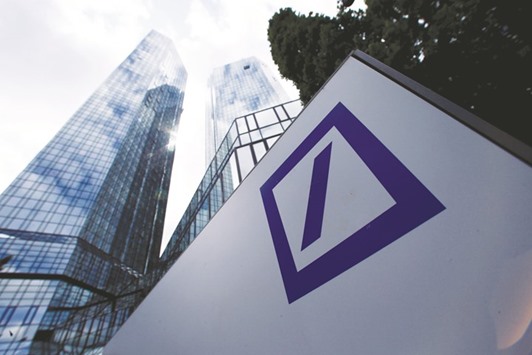Deutsche Bank rebounded from a record low after the German lender agreed to sell its UK insurance business for £935mn ($1.2bn) and Chief Executive Officer John Cryan ruled out a capital raise.
Responding to investor concerns that the bank may be forced to raise capital to meet mounting legal costs, Cryan told Germany’s Bild newspaper that it’s “currently not an issue.” The Frankfurt-based lender said yesterday that it sold its Abbey Life Assurance Co unit to Phoenix Group Holdings, boosting the capital Tier 1 ratio by about 10 basis points.
Shares of Germany’s largest bank have been pushed lower, dropping to a record this week, after the US Justice Department requested $14bn to settle an investigation into residential mortgage-backed securities. The claim sparked fresh investor concerns about the bank’s financial health as Cryan shrinks businesses and eliminates thousands of jobs.
“They’ve got an OK CET1 ratio right now and they’ve got to improve it - you can see how asset sales make sense,” Patrick Armstrong, managing partner at Plurimi Wealth, said in an interview with Bloomberg Television. “Any equity issuance would be incredibly dilutive right now with the overhang of fines facing Deutsche Bank, so they don’t want to be doing that right now.”
The shares rose 2.9% to €10.86 in Frankfurt after declining as much as 3.5% on Tuesday, helping pare losses to about 52% this year. The Bloomberg Europe Banks and Financial Services Index has dropped 24% in 2016.
Cryan, 55, has been under pressure to shore up capital buffers and profitability, hurt by volatile markets, negative interest rates and tougher regulatory scrutiny.
The lender earlier this year put a planned sale of its German consumer unit Postbank on hold, citing market conditions as one of the reasons.
While the sale of Abbey Life will help boost capital buffers, it will also cause a pretax loss of about €800mn, as the lender writes down the value of the division. Cryan said earlier this year that the lender is on track to reach its goal of a CET1 ratio, a measure of financial strength, of at least 12.5% by the end of 2018.
A settlement with the DOJ above €5.4bn ($6.1bn) would imply a capital increase is needed just to pay for the fine, according to Andrew Lim, an analyst at Societe Generale. Any additional $1bn in litigation charges would erode 24 basis points in capital, according to analysts at JPMorgan Chase & Co.
Deutsche Bank has said it expects to whittle down the DOJ settlement amount, just as other Wall Street banks did, with talks only in the early stages. Cryan told Germany’s most-read newspaper in comments confirmed by the lender that the DOJ will treat Deutsche Bank “with the same fairness as American banks that have already agreed on a compromise.”
Responding to speculation that the lender asked German Chancellor Angela Merkel for assistance, Cryan said that government aid was “out of the question.”
The German government is working on a contingency plan for Deutsche Bank, Die Zeit reported yesterday, without saying where it obtained the information. Possible scenarios apply in case the lender needs a capital injection to cover litigation costs and include the option of a government stake, the newspaper said.
The Finance Ministry said in a statement that it’s not preparing a rescue plan for the lender.
“There is a lot of uncertainty surrounding Deutsche Bank currently and they’re doing everything to reassure the public,” said Hans-Peter Burghof, a professor of banking at the University of Hohenheim in Stuttgart, Germany. “They made it clear to the US that there is no blank check from the German government to be expected.”
Cryan, who took over as sole CEO earlier this year, has already said that the bank may fail to be profitable in 2016, when calling it a “peak restructuring year” for the company. “We are restructuring the bank, we have fewer risks in the books than before and we are comfortably equipped with free liquidity, that is, financial means,” Cryan told Bild. “I always said that this transformation will require time. Everything is going according to plan in this respect.”
Europe’s largest banks have been forced to shrink their securities units to help shore up earnings. Credit Suisse Group CEO Tidjane Thiam said on Tuesday that the Swiss lender is mulling ways to cut costs further at the global markets unit, which houses securities trading. At Barclays, CEO Jes Staley has pledged to focus on more profitable parts of the business such as consumer banking.
Deutsche Bank could raise as much as €2.8bn by taking a tougher stance on employee compensation and not giving bonuses to thousands of staff, according to a note this week by Autonomous Research CEO Stuart Graham seen by Bloomberg News. It would also “provide a strong signal” to shareholders, he wrote.
Asked whether Deutsche Bank will scrap bonuses for the executive board for a second year, Cryan said that “nobody has unrealistic expectations” as the bank restructures its businesses. The board of directors will decide at the end of the year, he said.
“Talking to the news outlet with the broadest reach in Germany is some sort of last resort,” said Christoph Kaeserer, a professor and head of the department of financial management and capital markets at Munich’s Technische Universitaet. “Deutsche Bank’s intention is clear - they want to put an end to recent speculation about their capital strength.”

Deutsche Bank headquarters is seen in Frankfurt. Deutsche Bank rebounded from a record low after the German lender agreed to sell its UK insurance business for $1.2bn and chief executive officer John Cryan ruled out a capital raise.
